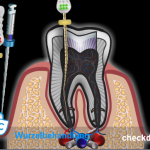Toothache – what is there to say about it?
A pain that most people are familiar with, but what exactly causes it? And what can you do about toothache?
 Starting with the tooth itself, if the neck of the tooth is exposed, this can cause toothache. The enamel does not always go over seamlessly into the root: sometimes some of the dentine is exposed. This area is usually found in the sulcus, below the visible gums.
Starting with the tooth itself, if the neck of the tooth is exposed, this can cause toothache. The enamel does not always go over seamlessly into the root: sometimes some of the dentine is exposed. This area is usually found in the sulcus, below the visible gums.
How can the neck of the tooth be exposed? – this can be explained as follows:
You do not practice proper dental hygiene for some time, plaque forms, and leads to inflammation of the gums, the gums swell and start to bleed. Bone matter begins to recede, you start taking better care of your teeth again, and the inflammation goes down. The inflammation of the gums also goes down, as does the swelling in the gums. But the inflammation has caused the gums to recede slightly, so the neck of the tooth is now exposed.
Using toothpaste containing fluoride helps to protect the dentine for the most part – but one day you drink too much fruit juice, the juice irritates the dentine, your teeth become sensitive to heat and cold. The pain does not stop until enough saliva accumulates in your mouth. One of many things which can lead to sensitive teeth.
Treatment:
After brushing your teeth, you can apply Elmex tooth gel and refrain from rinsing, if that doesn’t help then you can get the necks of your teeth sealed by a dentist!
–
Cavities reach the nerve of the tooth, the tooth nerve slowly starts to die, you feel a dull ache, if bacteria are very aggressive and the cavity especially large then the nerve does not die slowly but quickly; you get a pulsating and intense pain which stops after a few days.
Treatment:
Go to a dentist for root treatment!
–
 You do not bother getting any treatment, the pain goes away and you forget about the problem. But is does not quite go away completely, the inflammation spreads to the bone, the tooth suddenly becomes sensitive to pressure and it hurts when you bite down. It may take days, weeks, months or even years for bone to become inflammed. Even faulty root treatment can cause bone to become infected.
You do not bother getting any treatment, the pain goes away and you forget about the problem. But is does not quite go away completely, the inflammation spreads to the bone, the tooth suddenly becomes sensitive to pressure and it hurts when you bite down. It may take days, weeks, months or even years for bone to become inflammed. Even faulty root treatment can cause bone to become infected.
Treatment:
Root treatment or root tip resection by a dentist!
–
At some point you may notice a small bump on your gums, which bursts and releases pus. The pressure and the chewing problems decrease, the inflammation continues and bone continues to recede, but pus is able to escape through a fistule in the mouth and the pain goes away.
Treatment:
Root tip resection by a dentist!
–
 One other reason for a toothache is the pain caused by parodontitis. Sometimes the gums hurt, and sometimes the teeth – if the neck of the tooth is exposed, this can cause pain. This can be a dully pulsating or a hot and cold pain.
One other reason for a toothache is the pain caused by parodontitis. Sometimes the gums hurt, and sometimes the teeth – if the neck of the tooth is exposed, this can cause pain. This can be a dully pulsating or a hot and cold pain.
Treatment:
Parodontitis treatment by a dentist, oral irrigator!
VN:F [1.9.22_1171]
Rating: 0.0/5 (0 votes cast)
VN:F [1.9.22_1171]
 After root treatment it is normal for the tooth to continue hurting for another 2-3 days. This is because the bone around the tip of the root is irritated by treatment, and this can cause pain. But If the pain gets worse, you should inform your dentist.
After root treatment it is normal for the tooth to continue hurting for another 2-3 days. This is because the bone around the tip of the root is irritated by treatment, and this can cause pain. But If the pain gets worse, you should inform your dentist.












